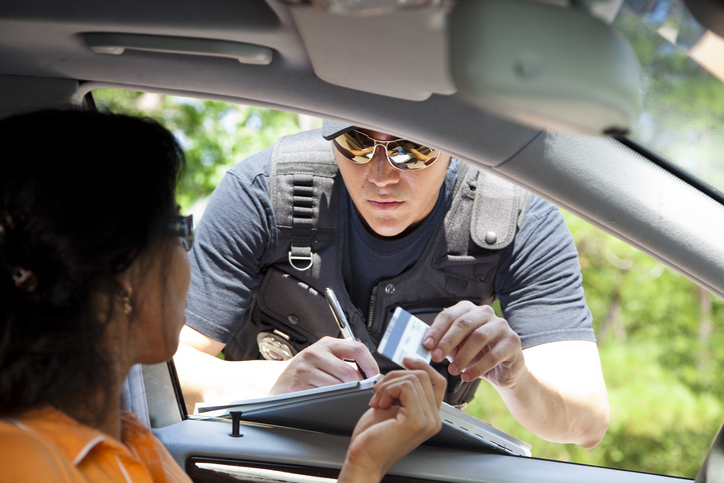By Patrick Mileham
DriveSafe Online Contributing Writer
Speeding tickets are part of your driving record so they may increase the amount you pay for insurance. That’s the bad news. The good news is there are several factors that must occur to actually trigger a rate increase. And keep in mind that there are options available to improve your record after you receive a ticket.
Poor Driving Record
If you have a history of moving violations, the odds are pretty high that you’ll pay more for your auto premium. Insurance companies check your driving record to determine your risk of having an accident, which actually means your risk of submitting a claim. If you have multiple traffic violations, including speeding tickets, insurance companies consider you a higher risk for an accident and require you to pay a higher insurance premium.
How fast you were going is another factor insurance companies consider. Drivers ticketed for exceeding the speed limit by 15 miles per hour are more likely to receive a rate increase than drivers caught going less than 10 miles over the limit. Excessive speeding is directly linked to high accident rates, so be prepared to pay if you like to drive fast.
Since your driving history is typically checked only when you request a policy quote or when an existing policy is up for renewal, a speeding ticket may not immediately impact your insurance rate. But you may want to plan for a possible rate bump once your driving record is reviewed.
Many states use a points system to grade your driving performance. For each moving violation, you receive a number of points. The more serious the violation, the more points you get. And the more points you have on your record, the more you can expect to pay for auto insurance.
Know the Consequences
Getting pulled over for speeding is an easy way to ruin your day. Before you slide behind the wheel again, consider these speeding facts:
- Nearly 41 million speeding tickets are written each year
- You have about a 1 in 6 chance of getting ticketed if you decide to exceed the speed limit
- Speeding can raise your insurance rate as much as 18% after your first ticket, and up to 34% after your second
It’s not hard to understand how speeding has become a big revenue generator for states. Between $3.8 billion – $5.4 billion is collected annually just from speeding motorists. Money, however, should not be the primary deterrent for speeding. In a report released by the National Highway Traffic Safety Administration, speeding killed more than 10,000 people in 2016, and was a contributing factor in 27% of all fatal accidents. It’s true that speed kills.
Reduce Your Insurance Rate
Insurance policies vary from company to company. If you get a ticket that increases your insurance rate, and if you also lose your good driver discount because of the violation, you could ultimately be out hundreds of dollars. Don’t panic. If your driving record reflects only an occasional driving offense, like a speeding ticket, there is a chance you can still keep your current insurance rate intact.
Here are a few options to help you avoid a jump in your insurance premium:
- Contest the Ticket: You have the option to request an in-person hearing to dispute the charge in court. Just remember that paying the fine is typically an admission of guilt. So, don’t pay the penalty before deciding to contest the ticket. If the court agrees with you, the ticket never appears on your record and your insurance remains unaffected.
- Attend Traffic School: Several states allow you to enroll in traffic school to reduce ticket fines or offset points on your driving record. Be sure to check with your local department of motor vehicles to learn if you qualify for this option. Remember, attending in-person traffic school doesn’t mean you can avoid paying the fine. It means you get the option to erase points from your record, which can keep the cost of your insurance premium from going up.
- Complete an Online Defensive Driving Course: This is perhaps the most popular option because it’s easy to fit into your busy schedule. Courses may range in length from 1-8 hours, depending on state requirements. Keep in mind that every state has its own set of standards and regulations, and each court may implement its own requirements for dealing with traffic violations. Many states allow drivers to complete online courses to reduce driving record points, which can help keep insurance rates lower. Check with your insurance agent and local authorities to find out if you qualify. There are many benefits for taking an online defensive driving course, read this article to learn more.
Avoid Insurance Premium Increases
Ultimately, the best strategy to avoid high insurance rates is to obey the law. We all know we shouldn’t speed, so why do we still do it? I’m late to work, I have an appointment, or I just want to be at home and in front of my TV. None of these excuses hold up when considering what happens if you get pulled over, or worse, if you cause an accident. There really are no good excuses for speeding. However, we are all human, and mistakes happen. If you receive a ticket for speeding, keep in mind that you have options for keeping your insurance premiums from skyrocketing.
If you’re serious about becoming a better driver and saving money on your auto insurance, visit DriveSafeOnline.org for more information.

Patrick M. is Editorial Director for the always expanding DriveSafe Online library of courses. With over two decades of experience developing award-winning training, he now focuses on innovating online driver safety training. Pulling from his background in journalism, he steers the wheel behind the creation of top-tier content that promotes a better journey—whether on the digital highway of learning or the real roads we travel every day.
